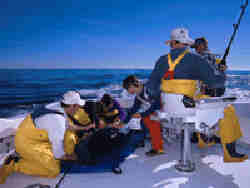Earth Sciences (also referred to as Geosciences), which deals with basic issues surrounding our planet, plays a vital role in the area of energy and raw materials supply.
Earth Sciences comprises subjects such as geology, geography, geological informatics, paleontology, mineralogy, petrography, crystallography, geophysics, geodesy, glaciology, cartography, photogrammetry, meteorology and seismology, early-warning systems, earthquake research and polar research.

Researchers confirm that waters migrating from the surface can take many tens of thousands of years to reach the water table
A team of researchers at Lawrence Livermore National Laboratory in California has confirmed that in drier regions, waters migrating from the surface can take many tens of thousands of years to reach the water table. Since such waters began their underground migration at the time of the last ice age, they hold a scientific and historical record of global climate

NASA scientists will venture into an isolated part of the Bolivian Amazon to try and uncover the origin of a 5 mile (8 kilometer) diameter crater there known as the Iturralde Crater. Traveling to this inhospitable forest setting, the Iturralde Crater Expedition 2002 will seek to determine if the unusual circular crater was created by a meteor or comet.
Organized by Dr. Peter Wasilewski of NASA’s Goddard Space Flight Center, Greenbelt, Md., the Iturralde Crater Expedition 2002 will be l

Sediments in the Arabian Sea will be examined by an international scientific expedition led by a researcher from the University of Edinburgh to increase understanding of the natural processes of the ocean floor and establish its significance for global cycles and climate change. Robotic research platforms will be deployed on the sea floor to study deep-sea organisms and their impacts on sedimentary processes, without removing the creatures from their natural environment. Monsoons—winds that blow in o

What will some 4,000 of the smartest dressed elephant seals, tuna fish, albatrosses, leatherback sea turtles, great white sharks, and other pelagic megafauna in the Pacific all be wearing in the coming seasons? How about the latest in microprocessor-based electronic tags, some no bigger than oversized cufflinks? It’s all in a continuing effort to understand the habits of marine animals in that part of the world: what exactly lives where and why, what their migration routes and diving behaviors m

In the late 1990s, as scientists were reaching consensus that the Arctic had gone through 30 years of significant climate change, they began reading the first published papers about the Arctic Oscillation, a phenomenon reported to have hemisphere-wide effects.
In short order the arctic-science and the global-change communities were galvanized, says Richard Moritz, polar oceanographer with the UW’s Applied Physics Laboratory and lead author of a review of recent Arctic climate change in

A NASA researcher finds that the amount of sea ice that moves between Greenland and Spitsbergen, a group of islands north of Norway, is dependent upon a “wave” of atmospheric pressure at sea level. By being able to estimate how much sea ice is exported through this region, called Fram Strait, scientists may develop further insights into how the ice impacts global climate.
This export of sea ice helps control the thermohaline circulation, a deep water ocean conveyor belt that moves warm, sal